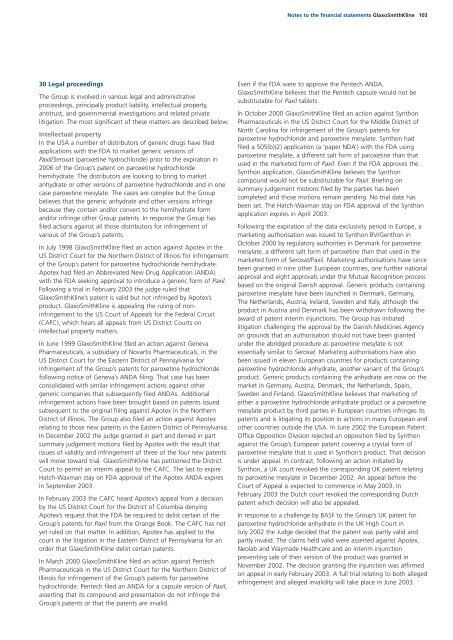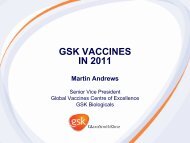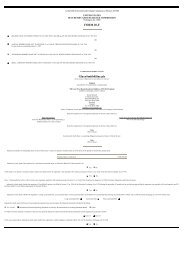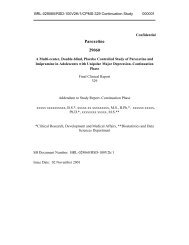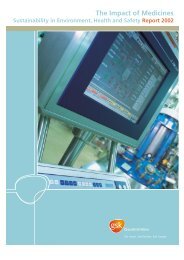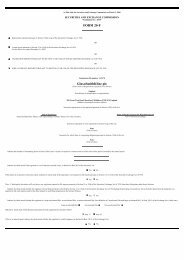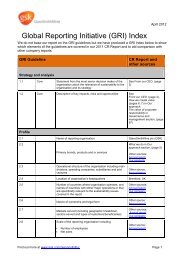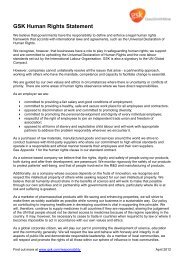GSK Annual Report 2002
GSK Annual Report 2002
GSK Annual Report 2002
Create successful ePaper yourself
Turn your PDF publications into a flip-book with our unique Google optimized e-Paper software.
30 Legal proceedings<br />
The Group is involved in various legal and administrative<br />
proceedings, principally product liability, intellectual property,<br />
antitrust, and governmental investigations and related private<br />
litigation. The most significant of these matters are described below.<br />
Intellectual property<br />
In the USA a number of distributors of generic drugs have filed<br />
applications with the FDA to market generic versions of<br />
Paxil/Seroxat (paroxetine hydrochloride) prior to the expiration in<br />
2006 of the Group’s patent on paroxetine hydrochloride<br />
hemihydrate. The distributors are looking to bring to market<br />
anhydrate or other versions of paroxetine hydrochloride and in one<br />
case paroxetine mesylate. The cases are complex but the Group<br />
believes that the generic anhydrate and other versions infringe<br />
because they contain and/or convert to the hemihydrate form<br />
and/or infringe other Group patents. In response the Group has<br />
filed actions against all those distributors for infringement of<br />
various of the Group’s patents.<br />
In July 1998 GlaxoSmithKline filed an action against Apotex in the<br />
US District Court for the Northern District of Illinois for infringement<br />
of the Group’s patent for paroxetine hydrochloride hemihydrate.<br />
Apotex had filed an Abbreviated New Drug Application (ANDA)<br />
with the FDA seeking approval to introduce a generic form of Paxil.<br />
Following a trial in February 2003 the judge ruled that<br />
GlaxoSmithKline’s patent is valid but not infringed by Apotex’s<br />
product. GlaxoSmithKline is appealing the ruling of noninfringement<br />
to the US Court of Appeals for the Federal Circuit<br />
(CAFC), which hears all appeals from US District Courts on<br />
intellectual property matters.<br />
In June 1999 GlaxoSmithKline filed an action against Geneva<br />
Pharmaceuticals, a subsidiary of Novartis Pharmaceuticals, in the<br />
US District Court for the Eastern District of Pennsylvania for<br />
infringement of the Group’s patents for paroxetine hydrochloride<br />
following notice of Geneva’s ANDA filing. That case has been<br />
consolidated with similar infringement actions against other<br />
generic companies that subsequently filed ANDAs. Additional<br />
infringement actions have been brought based on patents issued<br />
subsequent to the original filing against Apotex in the Northern<br />
District of Illinois. The Group also filed an action against Apotex<br />
relating to those new patents in the Eastern District of Pennsylvania.<br />
In December <strong>2002</strong> the judge granted in part and denied in part<br />
summary judgement motions filed by Apotex with the result that<br />
issues of validity and infringement of three of the four new patents<br />
will move toward trial. GlaxoSmithKline has petitioned the District<br />
Court to permit an interim appeal to the CAFC. The last to expire<br />
Hatch-Waxman stay on FDA approval of the Apotex ANDA expires<br />
in September 2003.<br />
In February 2003 the CAFC heard Apotex’s appeal from a decision<br />
by the US District Court for the District of Columbia denying<br />
Apotex’s request that the FDA be required to delist certain of the<br />
Group’s patents for Paxil from the Orange Book. The CAFC has not<br />
yet ruled on that matter. In addition, Apotex has applied to the<br />
court in the litigation in the Eastern District of Pennsylvania for an<br />
order that GlaxoSmithKline delist certain patents.<br />
In March 2000 GlaxoSmithKline filed an action against Pentech<br />
Pharmaceuticals in the US District Court for the Northern District of<br />
Illinois for infringement of the Group’s patents for paroxetine<br />
hydrochloride. Pentech filed an ANDA for a capsule version of Paxil,<br />
asserting that its compound and presentation do not infringe the<br />
Group’s patents or that the patents are invalid.<br />
Notes to the financial statements GlaxoSmithKline 103<br />
Even if the FDA were to approve the Pentech ANDA,<br />
GlaxoSmithKline believes that the Pentech capsule would not be<br />
substitutable for Paxil tablets.<br />
In October 2000 GlaxoSmithKline filed an action against Synthon<br />
Pharmaceuticals in the US District Court for the Middle District of<br />
North Carolina for infringement of the Group’s patents for<br />
paroxetine hydrochloride and paroxetine mesylate. Synthon had<br />
filed a 505(b)(2) application (a ‘paper NDA’) with the FDA using<br />
paroxetine mesylate, a different salt form of paroxetine than that<br />
used in the marketed form of Paxil. Even if the FDA approves the<br />
Synthon application, GlaxoSmithKline believes the Synthon<br />
compound would not be substitutable for Paxil. Briefing on<br />
summary judgement motions filed by the parties has been<br />
completed and those motions remain pending. No trial date has<br />
been set. The Hatch-Waxman stay on FDA approval of the Synthon<br />
application expires in April 2003.<br />
Following the expiration of the data exclusivity period in Europe, a<br />
marketing authorisation was issued to Synthon BV/Genthon in<br />
October 2000 by regulatory authorities in Denmark for paroxetine<br />
mesylate, a different salt form of paroxetine than that used in the<br />
marketed form of Seroxat/Paxil. Marketing authorisations have since<br />
been granted in nine other European countries, one further national<br />
approval and eight approvals under the Mutual Recognition process<br />
based on the original Danish approval. Generic products containing<br />
paroxetine mesylate have been launched in Denmark, Germany,<br />
The Netherlands, Austria, Ireland, Sweden and Italy, although the<br />
product in Austria and Denmark has been withdrawn following the<br />
award of patent interim injunctions. The Group has initiated<br />
litigation challenging the approval by the Danish Medicines Agency<br />
on grounds that an authorisation should not have been granted<br />
under the abridged procedure as paroxetine mesylate is not<br />
essentially similar to Seroxat. Marketing authorisations have also<br />
been issued in eleven European countries for products containing<br />
paroxetine hydrochloride anhydrate, another variant of the Group’s<br />
product. Generic products containing the anhydrate are now on the<br />
market in Germany, Austria, Denmark, the Netherlands, Spain,<br />
Sweden and Finland. GlaxoSmithKline believes that marketing of<br />
either a paroxetine hydrochloride anhydrate product or a paroxetine<br />
mesylate product by third parties in European countries infringes its<br />
patents and is litigating its position in actions in many European and<br />
other countries outside the USA. In June <strong>2002</strong> the European Patent<br />
Office Opposition Division rejected an opposition filed by Synthon<br />
against the Group’s European patent covering a crystal form of<br />
paroxetine mesylate that is used in Synthon’s product. That decision<br />
is under appeal. In contrast, following an action initiated by<br />
Synthon, a UK court revoked the corresponding UK patent relating<br />
to paroxetine mesylate in December <strong>2002</strong>. An appeal before the<br />
Court of Appeal is expected to commence in May 2003. In<br />
February 2003 the Dutch court revoked the corresponding Dutch<br />
patent which decision will also be appealed.<br />
In response to a challenge by BASF to the Group’s UK patent for<br />
paroxetine hydrochloride anhydrate in the UK High Court in<br />
July <strong>2002</strong> the Judge decided that the patent was partly valid and<br />
partly invalid. The claims held valid were asserted against Apotex,<br />
Neolab and Waymade Healthcare and an interim injunction<br />
preventing sale of their version of the product was granted in<br />
November <strong>2002</strong>. The decision granting the injunction was affirmed<br />
on appeal in early February 2003. A full trial relating to both alleged<br />
infringement and alleged invalidity will take place in June 2003.


